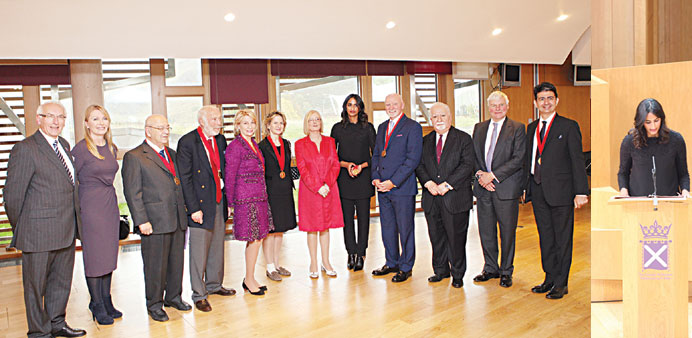|
|
HH Sheikha Moza bint Nasser was honoured at a ceremony in the Scottish Parliament yesterday for driving education reforms and programmes that have benefited the people of Qatar and many other nations.
HE Sheikha Hind bint Hamad al-Thani received the Carnegie Medal of Philanthropy on behalf of HH Sheikha Moza bint Nasser from William Thomson, great grandson of the Scottish philanthropist Andrew Carnegie.
Accepting the Carnegie Medal on behalf of her mother, Sheikha Hind said: “Over the last two decades, Her Highness has devoted her life to developing and enhancing the essential human component of our leadership’s vision for Qatar, which seeks to use our resources wisely and responsibly for the good of Qataris today and tomorrow and for the good of others less fortunate than us.”
During the awards ceremony, particular note was made of HH Sheikha Moza’s “tireless work” to provide Qataris of all ages and abilities the best opportunities to be educated, with the examples of Qatar Foundation, Education City and the Shafallah Centre being given.
The Carnegie Medal is awarded biannually to some of the world’s leading philanthropists. Often described as the “Nobel Prize of philanthropy”, the award recognises those who use their private wealth for public good.
“We honour Her Highness for devoting her life to the people of Qatar while asking nothing in return but that her country should continue moving forward,” said Thomson, who also drew attention to her work in the health sector and efforts to promote education globally through initiatives such as Educate A Child.
In his keynote address at the ceremony, Pierre Omidyar, founder and chairman of eBay and previous award recipient, noted that all of the initiatives founded by this year’s recipients, were characterised by the values of innovation, leadership and constant investment in human capital, which reflect Carnegie’s vision.
Andrew Carnegie was born in Scotland in 1835 and became a highly successful businessman in the US. He devoted his later life to philanthropy and argued that the wealthy have a moral obligation to distribute their riches for the public good.
He believed that education and knowledge should be freely available to all and is best known for developing public libraries.
The legacy of Andrew Carnegie’s philanthropy lives on through the 22 Carnegie institutions around the world, which established the Carnegie Medal of Philanthropy in 2001. These institutions select nominees for the Carnegie Medal of Philanthropy award as a way to honour Carnegie’s efforts to “do real and permanent good in this world”.
The selection committee judged that HH Sheikha Moza’s efforts in Qatar are a shining reflection of Carnegie’s vision of freely-available quality education and knowledge.
The other 2013 Carnegie Medal of Philanthropy recipients are: Dame Janet Wolfson de Botton, chairman of the Wolfson Foundation; Sir Tom Hunter, a long-term advocate of philanthropy; Dr James H Simons, chairman of the Simons Foundation; Marilyn H Simons, president of the Simons Foundation; and Dmitry Borisovich Zimin, founder of the Dynasty foundation.

